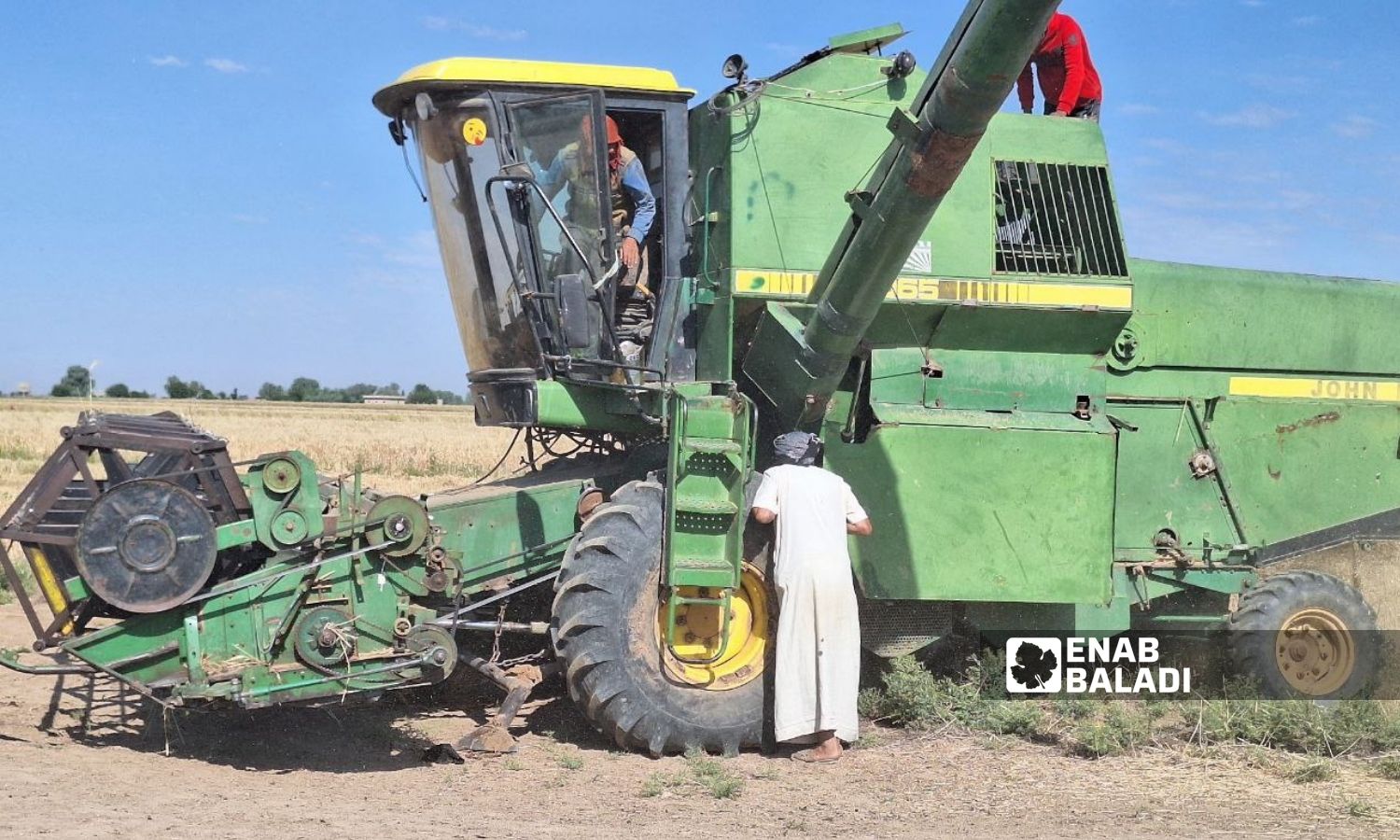



Farmers in the areas controlled by the Autonomous Administration of North and East Syria (AANES) have started looking for alternatives to sell their crop at prices below the official pricing set by the administration, which was set at 31 US cents per kilogram, in order to avoid additional losses when selling officially.
The farmers received the pricing decision for buying wheat for the 2023-2024 agricultural season as a “shock,” especially since it came in parallel with the pricing set by the Syrian regime, which reached 36 cents per kilogram.
The pricing did not change despite the protests by the farmers which lasted for several days.
The protests pushed AANES to justify the reasons for setting the price in its current form by the Agriculture and Irrigation Authority.
AANES explained its inability to increase the pricing compared to the previous year, when it was 43 cents for the same quantity, due to Turkish attacks, budget shortages, and the inability to export, which would result in “significant” financial losses, according to a report published by the Hawar news agency close to the Autonomous Administration.
Shihab al-Atrouz, a farmer in the village of al-Khoderat in northeastern rural Deir Ezzor, told Enab Baladi that market traders resorted to buying wheat from farmers at a lower price, with the price per kilogram ranging between 3500 and 4000 Syrian pounds, depending on the quality of the wheat (equivalent to 26 US cents).
The traders then supply the wheat to the Agricultural Development Company affiliated with the Autonomous Administration.
Al-Atrouz added to Enab Baladi that resorting to this option has its reasons, the most important of which is that the trader relieves the farmer of the burden of transportation and shipping costs, and most traders buy the wheat immediately after it is harvested.
On the other hand, the farmer Muawiya al-Awaid, from the town of Gien in eastern rural Deir Ezzor, was forced to sell to traders after the Autonomous Administration announced the wheat purchase price and set a mechanism for the parking of transporting vehicles and their fees.
Al-Awaid pointed out that selling to traders in the black market at a price of approximately 3800 Syrian pounds per kilogram is cheaper than bearing the cost of the mechanism that requires waiting in line in front of the directorate for more than ten days to get the farmer’s turn to sell, due to “favoritism and corruption,” as he told Enab Baladi.
The exchange rate of the US dollar is 14,850 Syrian pounds, according to the S-P Today website specialized in money exchange rates.
AANES’ Local Administration Authority had decided that a farmer who wants to sell must obtain a turn from the ticket office, coordinating the entry of vehicles according to the center’s schedule, and if the driver does not comply with the scheduled turn for any reason, a violation of one million Syrian pounds will be registered against the driver, and he will be sent to the end of the turn.
According to the decision published by AANES on May 8, the farmer has to pay 200,000 Syrian pounds every 24 hours during the waiting period.
The transportation fees charged to the farmer were set by AANES at $50 if the distance is between one kilometer and ten kilometers, and beyond that distance, the farmer pays one dollar for each additional kilometer.
The Agricultural Development Company works on buying wheat according to four grades, according to a table obtained by Enab Baladi.
The first grade wheat starts at $310 per ton, and the fourth grade wheat price reaches $260 per ton.
An employee at the Agricultural Development Company (who requested anonymity for security reasons) told Enab Baladi that the wheat is graded for the farmer, the lowest being the fourth grade, which contains a percentage of barley and weeds and is not filtered from straw and stones.
Some traders who buy wheat received threats from farmers to prevent them from supplying the product to the Autonomous Administration as a way of “pressuring” it to raise the price.
Grain trader Majd al-Ismail told Enab Baladi that he received several threats to burn his car and house if he sold the wheat to the Autonomous Administration before it raised the price to compensate for the farmers’ losses.
Suleiman al-Suleiman, a truck driver transporting wheat for traders, said that upon reaching the al-Maamel (Factories) area north of Deir Ezzor, he was stopped by three masked gunmen who threatened to burn the truck and its load if he continued on his way, forcing him to return towards western rural Deir Ezzor, as he told Enab Baladi.
The Autonomous Administration bought 1.15 million tons of wheat from farmers from the last harvest season at 43 cents per kilogram (3700 Syrian pounds at the time), and announced on July 31, 2023, the cessation of purchasing operations from farmers.
Wheat is considered one of the main strategic crops in Syria. The average production of the crop from 1990 to 2010 exceeded four million tons.
In 2006, Syria recorded the highest production number of 4.9 million tons, according to the Central Bureau of Statistics, with an average local consumption of 2.5 million tons, allowing an export surplus ranging between 1.2 and 1.5 million tons.
But for years, the regime’s government has been securing wheat from Russia through various methods and agreements, many of which details are rarely disclosed, or through tenders issued by the General Grain Corporation in Syria for buying wheat.
if you think the article contain wrong information or you have additional details Send Correction